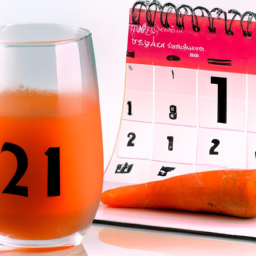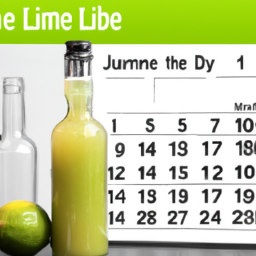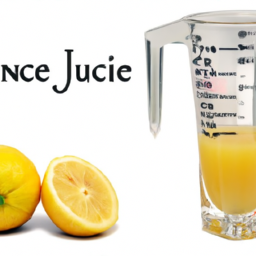I enjoy making a fresh batch of juice in my kitchen, and carrot juice is my favorite for a delicious and healthy boost. However, I often wonder how long my juice can last before it is no longer safe to drink. Although fresh carrot juice is great for its health benefits and tasty flavor, it does not stay fresh indefinitely.
In this article, I will explore the factors that affect the shelf life of fresh carrot juice and provide tips on how to extend its lifespan.
Fresh carrot juice is a great source of vitamins and minerals, but it is also highly perishable. Understanding the factors that affect its shelf life is essential to ensure that it remains safe to consume and does not spoil prematurely.
Temperature, light exposure, and oxygen exposure are the primary factors that can impact the shelf life of carrot juice. By taking steps to protect your juice from these factors, you can extend its lifespan and enjoy it for longer.
Let’s dive into the details and learn more about how to keep your fresh carrot juice fresh for as long as possible.
Key Takeaways
- Fresh carrot juice has a limited shelf life and should be consumed within 3-4 days for optimal taste and nutrition.
- Proper storage techniques such as refrigeration, airtight containers, and minimizing light and oxygen exposure can extend the shelf life of carrot juice.
- Signs of spoilage to watch out for include mold, foul odor, and changes in taste.
- Preservation methods such as freezing and slow, cold press juicing can also extend the shelf life of carrot juice.
Understanding the Shelf Life of Carrot Juice
You’ll want to drink your fresh carrot juice within 3-4 days to ensure optimal taste and nutrition. While carrot juice can be a refreshing and healthy beverage, it’s important to understand its shelf life. This means knowing how long it can be stored without losing its flavor and nutritional value.
Juice preservation techniques and best storage practices are key in maximizing the shelf life of your carrot juice. To start with, it’s important to keep your carrot juice refrigerated at all times. This will help to slow down the oxidation process and keep the juice fresh for longer. You should also transfer it into an airtight container, as this will prevent any bacteria or contaminants from entering the juice. Additionally, you can add lemon juice to the carrot juice to help preserve it. The acidic nature of lemon juice helps to keep the carrot juice fresh for longer.
With these juice preservation techniques and best storage practices in mind, you can enjoy fresh carrot juice for up to 4 days. When it comes to preserving the freshness of carrot juice, temperature plays a crucial role. Let’s explore this further in the next section.
The Role of Temperature
When it’s warm outside, temperature control plays a crucial role in preventing spoilage of fresh carrot juice. Carrot juice is a perishable item that can quickly spoil if not kept at the right temperature. The ideal temperature range for storing carrot juice is between 33°F to 40°F. Keeping the juice refrigerated at this temperature range will prolong its freshness and prevent bacteria growth.
Spoilage prevention is essential to keep your carrot juice fresh and safe for consumption. High temperatures can promote bacterial growth, leading to spoilage and a shorter shelf life. Therefore, it’s crucial to keep the juice chilled at all times.
Once the juice is removed from the refrigerator, it should be consumed within a few hours to prevent spoilage.
In the next section, we’ll explore the impact of light on the shelf life of carrot juice.
The Impact of Light
Did you know that exposing your delicious carrot juice to light can significantly reduce its shelf life? Light exposure can cause oxidation in the juice, which can lead to a loss of nutrients and a change in taste.
Here are three ways in which light exposure can impact the shelf life of your carrot juice:
-
Chlorophyll breakdown: When carrot juice is exposed to light, the chlorophyll in the juice can break down, causing the juice to turn brown and lose its freshness.
-
Vitamin depletion: Light exposure can cause the vitamins in the juice to break down, reducing the nutritional value of the juice.
-
Flavor change: The oxidation caused by light exposure can alter the flavor of your carrot juice, making it taste less fresh and more bitter.
The impact of light on your carrot juice is just one factor to consider when trying to extend its shelf life. In the next section, we’ll discuss the impact of oxygen exposure and how to prevent it.
Oxygen Exposure
When it comes to preserving the freshness and nutritional value of carrot juice, one key factor to consider is oxygen exposure.
As someone who enjoys making and drinking fresh carrot juice, I’ve found that sealing and refrigeration are crucial steps to take in order to minimize the amount of oxygen that comes into contact with the juice.
Additionally, there are various oxygen-free storage methods, such as vacuum sealing and using inert gases, that can further extend the shelf life of carrot juice.
Importance of Sealing and Refrigeration
To keep your fresh carrot juice at its best, don’t forget to seal it tightly and store it in the fridge. Vacuum sealing is one of the best ways to ensure that your juice stays fresh for a longer period of time. However, if you don’t have a vacuum sealer, there are alternative methods that you can use to seal your juice tightly.
Here are some tips to help you keep your fresh carrot juice fresh for as long as possible:
- Use airtight containers to store your juice.
- Leave some space at the top of the container to allow for expansion.
- Label your containers with the date you made the juice.
- Store your juice in the coldest part of the fridge.
By following these tips, you can extend the shelf life of your fresh carrot juice and enjoy it for longer periods of time. However, if you’re looking for even more ways to keep your juice fresh, consider exploring oxygen-free storage methods in the next section.
Oxygen-Free Storage Methods
One way you can ensure your juice stays at its peak freshness is by exploring oxygen-free storage methods. Vacuum sealing is a great option as it removes all the air from the container, preventing oxidation and prolonging the shelf life of your juice. This method is also commonly used in the food industry to preserve the freshness and quality of products.
Another option is fermentation, which involves the growth of beneficial bacteria that consume the sugars in the juice and produce lactic acid. This process not only extends the shelf life of the juice but also enhances its flavor and nutritional value. However, it’s important to note that fermentation requires specific conditions and should be done carefully to avoid the growth of harmful bacteria.
To ensure your juice stays fresh and healthy, it’s not just about sealing it in an oxygen-free container. Choosing the right storage container also plays a crucial role in maintaining the quality of your juice.
Choosing the Right Storage Container
Using airtight containers not only helps maintain the freshness of your carrot juice, but it also prevents any unwanted odors from seeping in.
When it comes to choosing the right storage container, there are a few things to keep in mind. Glass containers are generally preferred over plastic containers as they’re less prone to chemical leaching and more durable. Additionally, glass containers are less porous than plastic, which means they’re less likely to absorb any odors or flavors from the environment.
It’s also important to ensure that the container is airtight, as this’ll prevent any oxygen from getting in and causing the juice to spoil. However, some containers may be too airtight and not allow for any breathability, which can lead to the growth of bacteria and mold. Therefore, it’s important to strike a balance between air tightness and breathability to keep your carrot juice fresh for as long as possible.
Now, let’s move on to the next section about signs of spoilage.
Signs of Spoilage
If you don’t store your carrot juice properly, you may end up feeling disgusted by the sight of mold and a foul odor. That’s why choosing the right storage options is crucial in keeping your fresh carrot juice from spoiling quickly.
One of the best ways to preserve the quality of your juice is to store it in an airtight container and keep it refrigerated. This will help slow down the oxidation process and prevent bacteria from contaminating your juice.
Another sign of spoilage to watch out for is changes in taste. Fresh carrot juice should have a sweet, slightly earthy taste. If your juice starts to taste sour or has an off-putting flavor, it’s a clear indication that it’s time to throw it away.
By following these simple storage tips and being mindful of taste changes, you can extend the shelf life of your fresh carrot juice and enjoy its health benefits for longer.
Now let’s move on to the next section and learn more about how long fresh carrot juice is good for.
Shelf Life of Fresh Carrot Juice
To make sure you’re getting the most out of your carrot juice, it’s important to know how to properly store it and keep it at its best.
Fresh carrot juice has a relatively short shelf life, typically lasting around 24 to 48 hours when stored in the refrigerator. This is due to the fact that it’s a natural, unprocessed juice that hasn’t been treated with preservatives or additives.
There are ways to preserve fresh carrot juice for a longer period of time, such as freezing it or using a juicer with a slow, cold press method. However, these methods may slightly alter the nutritional benefits of the juice.
To extend the shelf life of fresh carrot juice, it’s important to properly clean and sanitize all equipment used in the juicing process, as well as use fresh, high-quality carrots.
How to Extend Shelf Life
You can extend the shelf life of your carrot juice by properly cleaning and sanitizing all juicing equipment and using high-quality, fresh carrots. After juicing, quickly transfer the juice into a clean, airtight container and store it in the refrigerator. Vacuum sealing is a great option to remove any excess air that may cause the juice to oxidize and spoil quicker.
It’s important to note that using preservatives such as lemon juice or citric acid can also help to extend the shelf life of carrot juice. However, these additives may alter the taste and nutritional value of the juice. Therefore, it’s best to avoid using them unless absolutely necessary.
Other considerations such as temperature and light exposure can also affect the shelf life of carrot juice, and should be taken into account when storing.
Other Considerations
When it comes to storing your carrot juice, it’s important to keep in mind that the way you store it can make or break its longevity. One thing to consider is the container you use. Glass containers are preferred over plastic as they don’t leach chemicals into the juice.
Another important factor to consider is temperature. Carrot juice should be stored in the refrigerator, ideally at a temperature below 40°F, to slow down the growth of bacteria.
Finally, it’s important to note that freshly squeezed carrot juice is most nutritious when consumed immediately after juicing. The longer it sits, the more nutrients it loses.
Carrots have long been known for their health benefits, and carrot juice is no exception. It’s a great source of vitamins A and C, potassium, and antioxidants. However, these nutrients can begin to degrade once the juice is exposed to light and air.
To prevent this, store your carrot juice in a dark container and minimize the amount of air in the container by filling it to the top. By following these storage tips, you can enjoy all the health benefits and nutrients of freshly squeezed carrot juice for up to 72 hours.
Frequently Asked Questions
Can carrot juice be frozen to extend its shelf life?
Yes, freezing benefits carrot juice by extending its shelf life. However, taste changes and texture alterations may occur. Thawing tips include placing the juice in the refrigerator and gently shaking to redistribute any settled solids.
How long does carrot juice last if it is not refrigerated?
Carrot juice should always be refrigerated to extend its shelf life. If left unrefrigerated, it may only last a few hours due to bacteria growth. Proper carrot juice storage tips can preserve its nutrients and flavor. Drinking fresh carrot juice offers numerous health benefits.
Is it safe to consume carrot juice that has been left out overnight?
Leaving carrot juice out overnight can pose potential dangers due to the impact of temperature and oxidation. Recommended storage is in the refrigerator. It’s best to consume within 24 hours for optimal freshness and safety.
How often should I shake or stir carrot juice while it is in storage?
Shaking carrot juice while in storage helps to evenly distribute the nutrients and prevent separation. It is important to refrigerate the juice to prevent bacterial growth and maintain freshness.
Can I mix other fruits and vegetables with carrot juice without affecting its shelf life?
Juice combinations can enhance the nutritional benefits of carrot juice. However, mixing other fruits and vegetables may affect its shelf life. Scientifically, it’s best to consume fresh juices immediately to maximize nutrient absorption.
Conclusion
In conclusion, as someone who loves to make and consume fresh carrot juice, I’ve learned that understanding its shelf life is crucial. Through my research, I’ve discovered that temperature, light, and oxygen exposure all play a significant role in determining how long the juice will last. The storage container used also affects the juice’s shelf life.
It’s essential to look out for signs of spoilage and to consume the juice within the recommended time frame. To extend the shelf life of fresh carrot juice, one can store it in a cool, dark place, use an opaque container, and consume it within a few days of making. Additionally, pasteurization or freezing can be used to increase the juice’s shelf life.
Overall, being mindful of these factors can ensure that the juice remains fresh and nutritious for a longer period, allowing us to enjoy all the benefits of this delicious and healthy beverage. Using the rhetorical device of repetition, I’ve emphasized the importance of being aware of the various factors that affect the shelf life of fresh carrot juice.
Ilana has been a vegan for over 10 years. She originally made the switch for health reasons, but soon found herself becoming more and more passionate about the ethical and environmental implications of a vegan lifestyle. Ilana is the author of The Graceful Kitchen, a blog all about veganism. She loves to cook up delicious and nutritious vegan meals, and share her recipes with others who are interested in leading a cruelty-free life. Ilana is also a strong advocate for using whole foods as the foundation of a healthy diet, and believes that going vegan is one of the best ways to achieve this.










